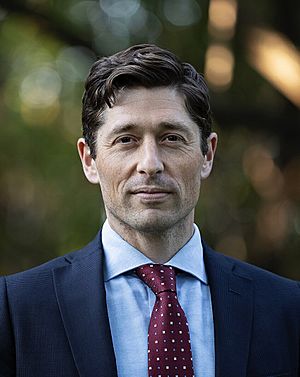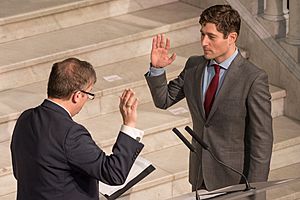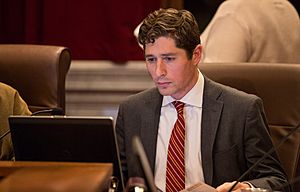Jacob Frey facts for kids
Quick facts for kids
Jacob Frey
|
|
|---|---|

Frey in 2021
|
|
| 48th Mayor of Minneapolis | |
| Assumed office January 2, 2018 |
|
| Preceded by | Betsy Hodges |
| Member of the Minneapolis City Council from the 3rd ward |
|
| In office January 2, 2014 – January 2, 2018 |
|
| Preceded by | Diane Hofstede |
| Succeeded by | Steve Fletcher |
| Personal details | |
| Born |
Jacob Lawrence Frey
July 23, 1981 Oakton, Virginia, U.S. |
| Political party | Democratic |
| Spouses |
Michelle Lilienthal
(m. 2009; div. 2014)Sarah Clarke
(m. 2016) |
| Children | 1 |
| Education | College of William & Mary (BA) Villanova University (JD) |
| Signature |  |
Jacob Lawrence Frey (born July 23, 1981) is an American politician and lawyer. He has been the mayor of Minneapolis, Minnesota since 2018. He is a member of the Minnesota Democratic–Farmer–Labor Party. Before becoming mayor, he served on the Minneapolis City Council from 2014 to 2018. He was first elected mayor in 2018 and was reelected in 2021.
Frey grew up in Virginia. He went to the College of William & Mary on a scholarship for track and field. Later, he studied law at Villanova University. After law school, he moved to Minneapolis. He worked as a lawyer focusing on civil rights before he started his political career.
About Jacob Frey
Jacob Frey grew up in Oakton, Virginia, which is a town near Washington, D.C.. His parents were professional modern ballet dancers. His mother has Russian-Jewish family roots. His father became Jewish.
Education and Running Career
Frey went to William & Mary after high school. He earned a degree in 2004. While there, he was a long-distance runner on the track and field team. He was also an all-Colonial Athletic Association (CAA) cross-country runner. He competed in national championships and won a 5,000-meter race title in 2002.
After college, Frey got a contract from a shoe company to run professionally. He ran in several marathons. He also competed for Team USA in the 2007 Pan American Games marathon, where he finished fourth.
Frey moved to Minneapolis in 2009. He had just graduated from Villanova University School of Law. He started working as a lawyer, focusing on civil rights.
Family Life
Jacob Frey married his first wife, Michelle Lilienthal, in 2009. They later divorced. He married his second wife, Sarah Clarke, in 2016. Sarah Clarke works as a lobbyist. She helps different businesses and groups at the Minnesota legislature. In 2020, Jacob and Sarah had their first child. In January 2025, they welcomed their second child.
Frey is a Reform Jew. He attends a Reform synagogue in Minneapolis, Temple Israel, with his wife.
Mayor of Minneapolis
Frey announced he would run for mayor of Minneapolis in January 2017. He promised to increase support for affordable housing. He also wanted to improve how the police and community work together. He won the 2017 election. This made him Minneapolis's second Jewish mayor. He was also one of the youngest mayors the city has had.
Reelection and City Leadership
Frey was reelected as mayor in 2021. He won with 56.2% of the votes. He is the first mayor to serve under a new "Strong Mayor" system. This system gives the mayor more direct control over city departments. These include the police department. Frey supported this change to help manage the police department better.
In 2024, Frey set a record for the number of vetoes he issued in a year. A veto means he rejected a decision made by the City Council. Some of the things he vetoed included a ceasefire resolution and a minimum wage for rideshare drivers.
In January 2025, Frey announced he plans to run for a third term. He said this would be his last time running for mayor.
City Infrastructure and Development
In 2022, Frey vetoed a plan to change Hennepin Avenue. The plan included a permanent bus lane. He was concerned about parking for local businesses. The street was later redeveloped with a bus lane that is open during busy hours.
In 2025, Frey vetoed a plan to make George Floyd Square a pedestrian mall. This plan was supported by community groups. His administration later suggested a different plan. This plan would allow traffic to fully return to the street.
Frey has also supported making Nicollet Mall a "pedestrian utopia." This means making it a great place for people to walk and enjoy. He wants to move bus traffic to other streets. He also supports allowing open containers in certain areas. He wants to turn empty downtown office buildings into homes.
Housing and Helping the Homeless
Frey's first budget as mayor focused a lot on affordable housing. He set aside $40 million for affordable housing. This was three times more than the city had spent before.
As mayor, Frey supports a plan to allow building four-plexes in all parts of the city. Before this, most of Minneapolis was only for single-family homes.
In 2018, the Minneapolis City Council approved a plan called Minneapolis 2040. This plan changed zoning rules. It allows three-family homes in neighborhoods. It also removes parking requirements for new buildings. This plan made Minneapolis the first major U.S. city to end single-family home zoning. This policy had caused segregation and high housing costs in the past.
In April 2025, Frey stated that only 27 people in the city were experiencing homelessness without shelter. He has supported clearing large homeless camps. He believes this has helped reduce homelessness. However, he received criticism for closing Camp Nenookaasi. This was a large camp mainly for Native American people.
Frey does not support rent control, especially for new buildings. He vetoed a ballot question in 2021 that would have allowed rent control measures.
Police Reform Efforts
Frey has supported increasing the budget for the Minneapolis Police Department (MPD) each year. Some community groups have protested these increases. They want more money for community-led safety programs.
In April 2018, Frey introduced changes to the MPD's body camera rules. These changes meant stricter consequences for officers who did not follow the rules. In 2019, he announced a ban on "warrior" training for police officers. This training had been taken by an officer involved in a past shooting.
After the start of protests in May 2020, Frey supported firing the four police officers involved in George Floyd's death. He also called for criminal charges against Derek Chauvin.
In June 2020, Frey directed changes to the MPD that the City Council approved. These changes included banning chokeholds and neck restraints. Officers were also required to report and stop other officers from using too much force. Police chiefs also had to approve the use of crowd-control weapons.
In November 2020, Frey announced that the MPD was banned from using no-knock warrants. However, after a later incident, Frey admitted that this ban had not been fully put into place.
On June 6, 2020, many protesters marched to Frey's apartment. They asked if he would agree to reduce funding for the MPD. He replied, "I do not support the full abolition of police." Protesters then chanted at him as he left.
In August 2022, it was announced that the MPD would use drones. This decision was made under Frey's control. The purchase of drones continued despite criticism from many people at a city council meeting.
Frey has said he asked Governor Tim Walz to send the National Guard during the protests. The National Guard's actions during the uprising caused many injuries. The University of Minnesota found that these actions violated United Nations guidelines. There were also reports that the MPD used too much force against protesters.
In July 2023, Frey signed an order. This order made enforcing laws about entheogenic plants, like psychoactive mushrooms, a very low priority for the MPD. In May 2025, the US Justice Department ended its agreement to oversee reforms for the MPD. Frey said the city would still continue to make the reforms.
Sanctuary City Status
In January 2025, Frey stated that the City of Minneapolis would not help identify undocumented immigrants. He said the MPD would not help Immigration and Customs Enforcement (ICE). In March 2025, Frey confirmed that Minneapolis would remain a sanctuary city for undocumented immigrants.
Roof Depot Project
In 2016, the City of Minneapolis bought the Roof Depot property. This site used to be a pesticide factory. The city planned to expand its Public Works campus there. The site was known to have a lot of arsenic. This caused concerns about health risks from the demolition. Frey said the demolition could be done safely. But local residents, many from low-income and diverse backgrounds, strongly opposed it.
A group called the East Phillips Neighborhood Institute (EPNI) led the opposition. They wanted to turn the property into an urban farm. This farm would have sustainable agriculture and community spaces.
In 2022, Frey vetoed a City Council vote to stop the project. This kept the demolition plans on track. In February 2023, activists briefly occupied the site to stop the demolition. Frey's administration directed the MPD to clear the area. Six protesters were arrested.
The Minnesota Court of Appeals temporarily stopped the demolition. This gave activists a chance to appeal. However, Frey has continued to support the project. He has offered to split the property for both public works and community use. But activist groups argue this would still put industrial development over residents' health.
Labor Relations
Frey has vetoed two laws that aimed to ensure rideshare drivers, like those for Uber and Lyft, earn at least the city's minimum wage.
In early 2024, Frey made a comment about people working from home. He said that people who work from home for more than three months become "losers." He later said this was a joke that was misunderstood.
In September 2024, Frey vetoed a plan to create a labor standards board. This board would have given policy ideas to the City Council. Frey had supported the idea earlier but changed his mind after hearing concerns from local business leaders.
Response to Pro-Palestinian Activism
In early 2024, Frey vetoed a ceasefire resolution from the City Council. He called it "one-sided." He then created his own version of the resolution. This version supported a two-state solution.
In December 2024, Frey vetoed a statement supporting students. These students had occupied a building at the University of Minnesota. They wanted the university to stop investing in certain companies. Frey said he vetoed the resolution because he did not support "damaging property and endangering the safety of others."
Plans for the Third Police Precinct
In October 2024, Frey urged the City Council to approve a plan. This plan would rebuild the Minneapolis's 3rd Police Precinct. This building was burned during the 2020 uprising. He suggested replacing it with a "democracy center." Critics said that other ideas from community groups were not considered fairly.
The mayor's office asked the community for their ideas on where the 3rd Precinct should be rebuilt. The results suggested not rebuilding at the same location. However, some people criticized this process. They felt it was designed to make people agree to a plan that was already decided.
Minneapolis City Council
Frey ran for the 2013 Minneapolis City Council election to represent Ward 3. He received support from his party and many officials. His goals included improving services for residents. He also wanted to encourage new housing and support small businesses. He aimed to fully fund affordable housing and address climate change. He won the election and took office on January 2, 2014.
As a City Council member, Frey focused on affordable housing and environmental policy. He also worked on workplace rules and voting access. He helped increase funding for the city's Affordable Housing Trust Fund in 2015.
In 2016, Frey created a rule requiring polluters to pay fees. These fees are based on how much pollution they create. The money from these fees helps support green business improvements. Since this program started, pollution linked to climate change has gone down a lot.
Frey also helped create the council's 2016 paid sick leave rule. He also worked on the 2017 minimum wage rule. He was one of the first council members to support a minimum wage. He helped add a change to the minimum wage rule. This change gave small businesses more time to start paying the new minimum wage.
As the head of the council's Elections Committee, Frey worked to pass a rule. This rule required landlords to give tenants voter registration information. This rule became a model for other cities. However, a federal judge later said the rule was not allowed by the Constitution. Frey also helped expand early voting in Minneapolis before the 2016 election. He increased the number of early voting places from one to five.
Images for kids
See also
 In Spanish: Jacob Frey para niños
In Spanish: Jacob Frey para niños





